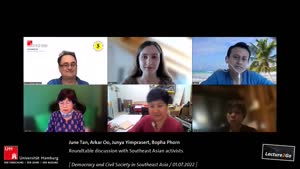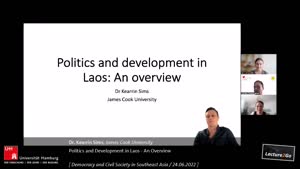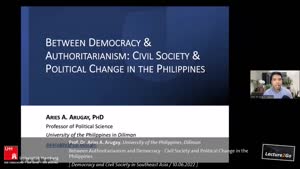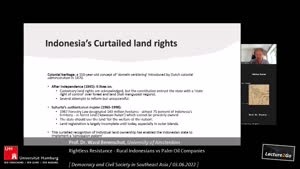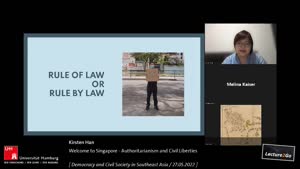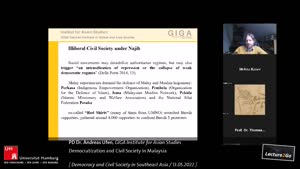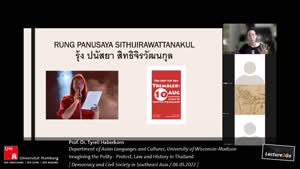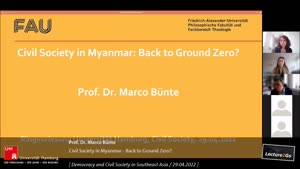Civil Society in Myanmar - Back to Ground Zero? - Prof. Dr. Marco Bünte - Universität Hamburg
- Lecture2Go
- Videokatalog
- F.5 - Geisteswissenschaften
- Asien-Afrika-Institut
- Democracy and Civil Society in Southeast Asia
Videokatalog
1417 Aufrufe
29.04.2022
Civil Society in Myanmar - Back to Ground Zero?
Whereas civil society has been described as a `void’ two decades ago (Steinberg), the era of political reforms of the past decade saw an explosion of collective social action. The tutelary regime was confronted with a number of protest movements, which highlighted the growing significance of civil society organizations and social movements. Civil society could gain significant ground and could influence the political process both during the Thein Sein government (2011-2015) and the recent NLD government (2015-2020). Civil society could gain significant political space and could influence the political process in the last decade. Its impact impact, however, was highly ambiguous: On the one hand, we could witness the emergence of the 'dark side of civil society' with the rise of ultranationalist Buddhist monks and the silence of civil society during the ethnic cleansing of the Rohingya. On the other hand, we could see the transformative potential in the rise of reformist groups which lobbied for reforms. While the coup in February 2021 unleashed a number of creative protests and collective action, the repression of civic protest forced civil groups to go underground again and led to another exodus of civil society actors. The talk is going to discuss the evolution of political spaces for civil society in Myanmar from a historical perspective. It describes the state’s response to social protest and tries to give an understanding of the spaces that exist after the coup of February 2021.
Marco Bünte is Professor of Asian Politics at the Friedrich-Alexander University Erlangen Nuremberg (FAU). His research focusses on comparative democratization, civil-military relations, social movements, civil society. His main region of research is Southeast Asia, here particularly Indonesia, Thailand and Myanmar. He is the co-editor of the Journal of Current Southeast Asian Affairs. His worked has appeared in disciplinary outlets such as Armed Forces&Society, Contemporary Politics, Government&Opposition and regional outlets such as Journal of Contemporary Asia, Contemporary Southeast Asia, amongst others. He is also the co-editor of Presidentialism and Democracy in East Asia (Routledge 2022, with Mark Thompson) and Politics and Constitutions in Southeast Asia (Routledge 2017, with B. Dressel).
Technischer Support
Bitte klicken Sie auf den nachfolgenden Link und füllen Sie daraufhin die notwendigen Felder aus, um unser Support-Team zu kontaktieren!
Link zu der RRZ-Support-Seite

